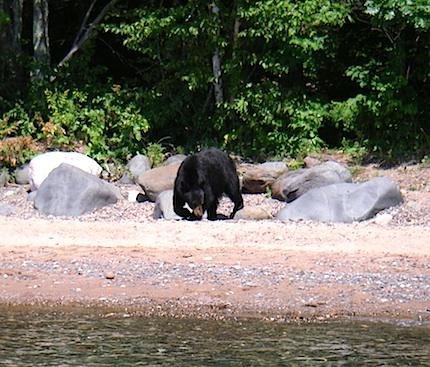Sequestration impacts around the National Park System are difficult to see at times. There are closed campgrounds and visitor centers, but often those are somewhat isolated incidents. Staffing reductions are mentioned, but not often seen by the visiting public.
But could those reductions be tied in some fashion to the bear problems that have closed Sand Island to the public at Apostle Islands National Lakeshore in Wisconsin?
"Obviously, the bear behavior itself is not something I can blame on the federal budget," answers Superintendent Bob Krumenaker.
But how the lakeshore responds to that behavior, and works to educate the public about proper food storage in bear territory, can be tied to staffing levels. Last year the lakeshore was able to hire a seasonal ranger who worked in large part on visiting the islands, interacting with the public and, when necessary, discussing the need to keep clean campgrounds and food on boats out of a bear's reach, Superintendent Krumenaker said during a phone interview.
“Because he was a seasonal, he didn’t have all the collateral duties that the regular park rangers had, so he spent all his time in the field," said the superintendent.
This year, though, due to the budget cuts sequestration has imposed on the National Park Service in general and Apostle Islands specifically, the lakeshore has had “somewhat less presence of rangers to be in campgrounds to talk to people about how to make sure your food is well-contained and to issue warnings or citations as necessary when they find violations," Superintendent Krumenaker said.
Would such a presence this year have prevented the bear problems? That's difficult to say, he acknowledged. However, he went on, "we would have been more on top of the trends in the campgrounds and would have been able to get on top of this more quickly.”
Park officials initially closed the nearly 3,000-acre Sand Island to overnight use on July 1 because a bear (or bears) had been raiding campsites. Day use was still permitted, however. Nonetheless, on July 3 a bear climbed at least twice onto a boat that was beached at Lighthouse Bay and successfully removed sausages and other food from a cooler. While the bear has not acted aggressively toward humans, and does run away when frightened, he or she keeps coming back.
When the island is reopened to the public currently is up in the air. That uncertainty has affected one local marina operator, who told the superintendent his business has suffered because the island, a popular stop for lakeshore boaters, is off-limits.
“The reality is, this is a safety issue. I’m sympathetic to the fellow’s concerns, but I don’t see how we could have made another decision that would have been as conservative for both people and the bear," said Superintendent Krumenaker.
According to the Park Service, the bear population on Sand Island nearly doubled between 2002 and 2010 (from 6 to 10 bears) and the population of 18 bears on 5,078-acre Oak Island is exceptionally high. For many years Stockton Island was thought to have the highest population density in Wisconsin and among the highest in North America, the agency notes. That title has been passed to 10,054-acre Oak Island, with Sand Island a close second.


 Support Essential Coverage of Essential Places
Support Essential Coverage of Essential Places






